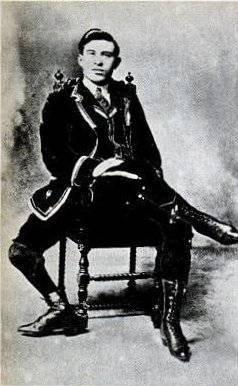Raymond Smullyan doesn’t believe in astrology.
When asked why, he says, “I’m a Gemini.”
Raymond Smullyan doesn’t believe in astrology.
When asked why, he says, “I’m a Gemini.”

In April 1828, Ann Marten was growing increasingly worried about her daughter, Maria. The girl had eloped recently from Suffolk with her lover, William Corder, but Ann had not heard from her since. Corder gave various explanations: A letter had been lost, he said, or Maria was ill or had hurt her hand.
One night Ann awoke her husband in great agitation: She had had a vivid dream, she said, that their daughter’s body was buried under the “right-hand bay of the further side of Corder’s red barn,” where the couple had met to begin their journey. She persuaded her husband to investigate, and to their horror he discovered their daughter’s body buried in a sack just where her dream had indicated.
The case made a sensation. Corder was retrieved and tried and eventually confessed: He had shot Maria in the eye during an argument in the barn. He was hanged in August and his body left for medical students, and the rope was sold at a guinea an inch to the morbid throng. The dream was never explained.
Light travels 186,000 miles per second. The average diameter of Earth’s orbit is 186 million miles.
So, on average, sunlight reaches us in a neat 500 seconds.
mouton enragé
n. a normally peaceful person who has become suddenly enraged or violent
Literally, “angry sheep.”

It’s somehow appropriate that Francesco Lentini was born in Italy, “the boot of Europe.” He had three legs, four feet, and 16 toes — his third leg had a rudimentary foot growing from the knee.
When doctors determined they couldn’t safely remove the extra parts, Lentini moved to the United States and made a career kicking soccer balls in sideshows. Eventually he married and raised four children.
He died in 1966 at age 77, setting a record as the longest-lived man with three legs.
At five o’clock in the afternoon of October 19th, 1874, an immense concourse of people assembled in the city of Cincinnati, Ohio, to witness the ascent of a bride and bridegroom in a balloon to be married in the air by a clergyman who ascended with them, and delivered an address to the crowd before the machine was set free. The couple were horse-riders in a circus, and the idea was, no doubt, that of combining business with pleasure, since hundreds would be curious to see them in the circus after their marriage, who, before that remarkable event took place, would only regard them with the ordinary amount of curiosity due to their skill as riders.
— The World of Wonders, 1883
Samuel Johnson’s 1755 dictionary defines garret as “a room on the highest floor of the house.”
It defines cockloft as “the room over the garret.”

Julia Moore’s poetry was so bad that it gained a national following even among her contemporaries in the 1870s. One reviewer wrote, “Shakespeare, could he read it, would be glad that he was dead”:
They once did live at Edgerton,
They once did live at Muskegon,
From there they went to Chicago,
Which proved their fatal overthrow.
It was William House’s family,
As fine a family as you see—
His family was eleven in all,
I do not think it was very small.
She stopped writing when she saw that her fans were laughing, not weeping — and, immortally, she closed her career with these lines:
And now kind friends, what I have wrote
I hope you will pass o’er,
And not criticise as some have done
Hitherto herebefore.
“We used to have a dog named Snoopy, you know, a real live dog. I suppose people who love Snoopy won’t like it, but we gave him away. He fought with other dogs, so we traded him in for a load of gravel.” — Charles M. Schulz